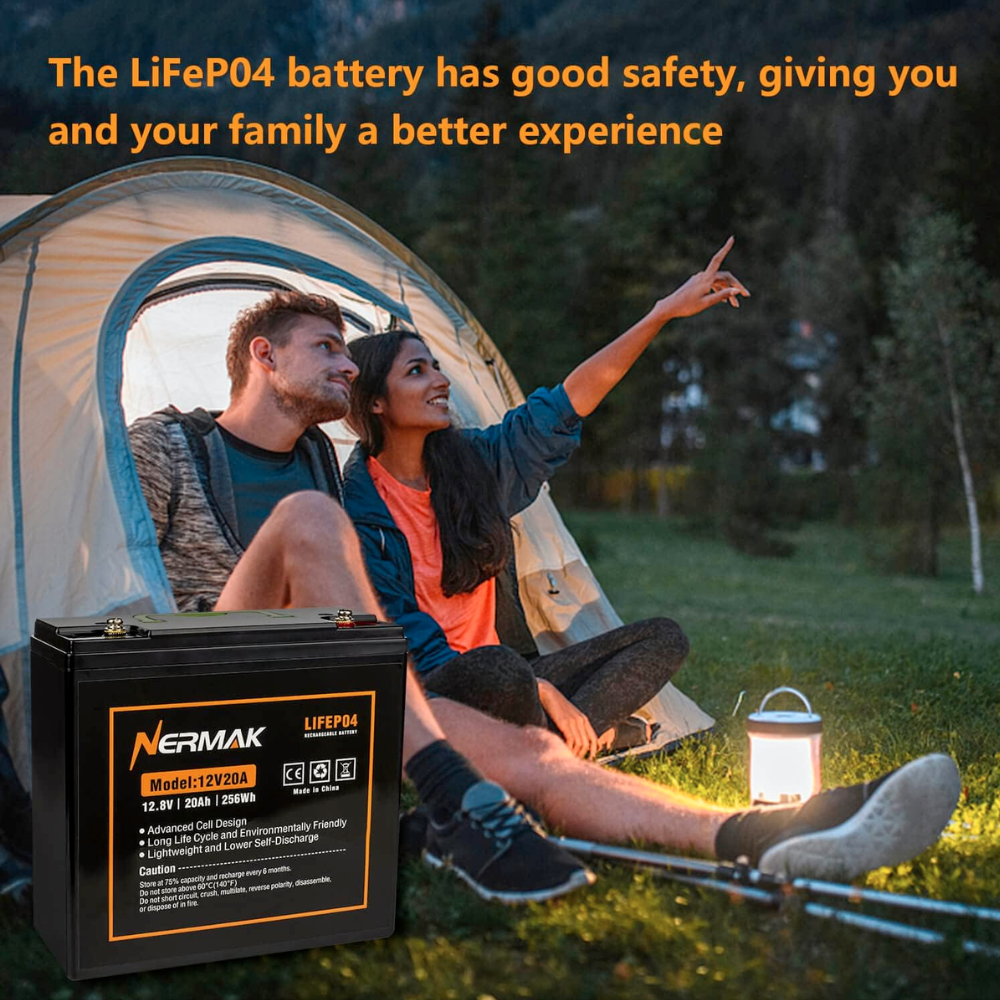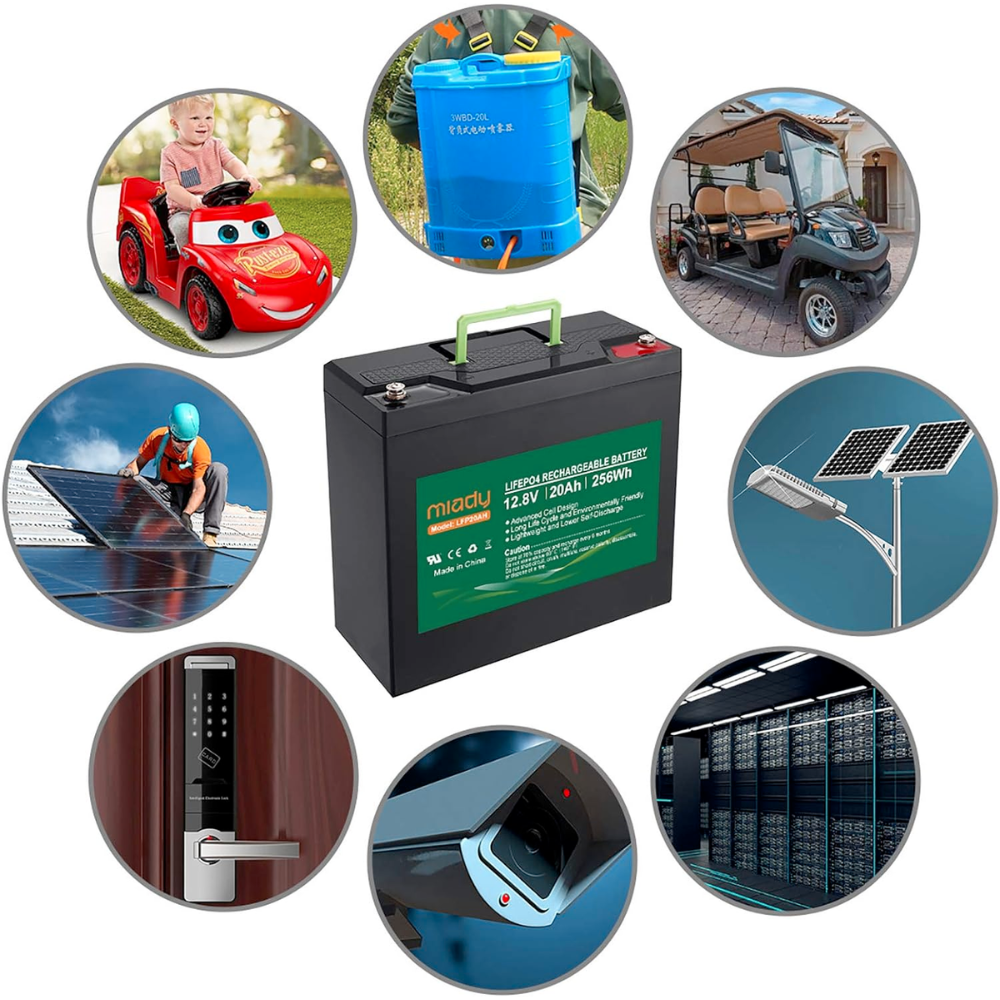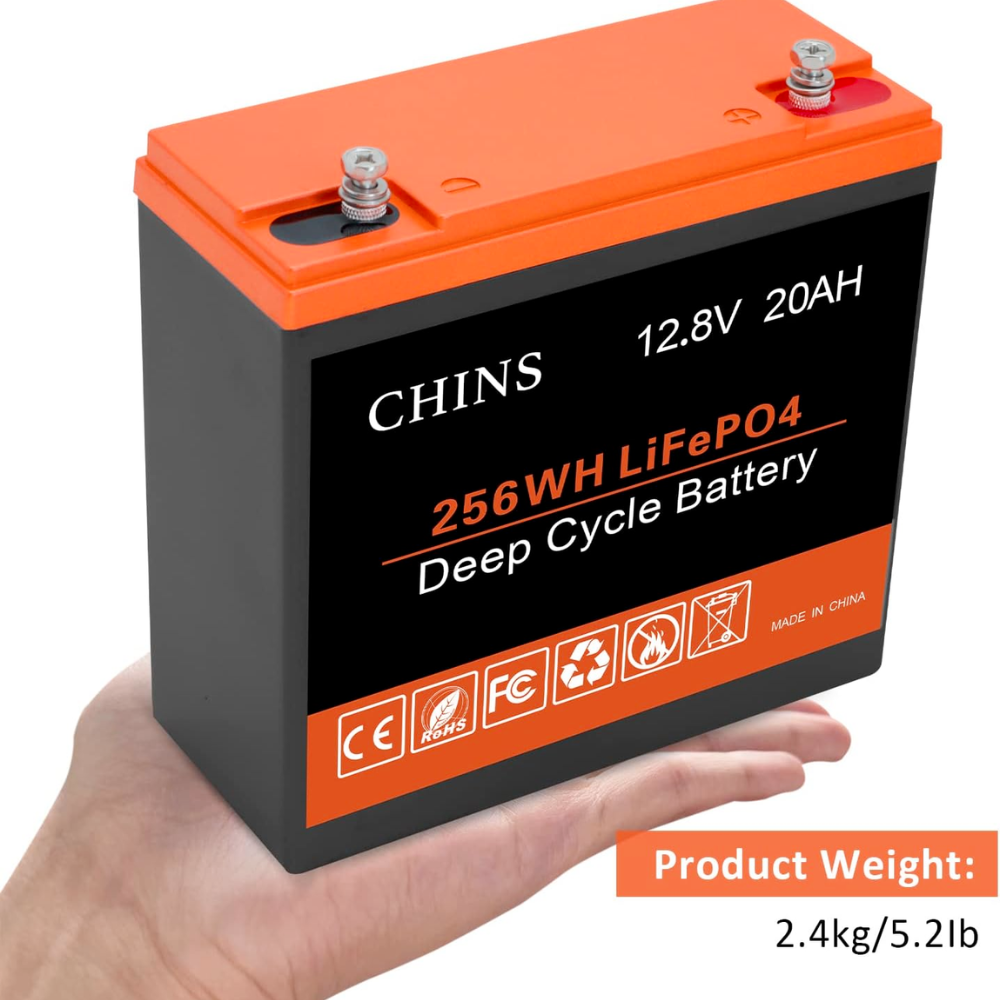Key Takeaways:
- LFP batteries offer a unique combination of safety, longevity, and eco-friendliness compared to other lithium ion batteries.
- They are increasingly popular in electric vehicles and energy storage systems due to their thermal stability and lower cost.
- Understanding the advantages and applications of LFP technology can help consumers and industries make informed decisions about energy storage.
- FYI — Techi-Becky Reviews may collect a share of sales or other compensation from being an Amazon Associate, we earn commissions from qualifying purchases from links on this page if you decide to buy something (that's how we stay in business) Thanks for reading!
1. What Are LFP Batteries?
Lithium Iron Phosphate (LFP) batteries are a type of lithium ion battery that uses lithium iron phosphate as the cathode material. Unlike other batteries that may use nickel and cobalt, LFP batteries stand out for their chemical stability and safety features. They are known for their ability to withstand high temperatures without experiencing thermal runaway, a common safety concern with other lithium battery chemistries.
2. The Safety Edge: Thermal Stability and Non-Toxicity
Safety is a paramount concern when it comes to battery technology. LFP batteries excel in this area due to their high thermal and chemical stability. This stability minimizes the risk of catching fire, even under extreme temperatures or if damaged. Additionally, the non-toxic nature of the phosphate-based cathode makes LFP batteries an environmentally friendlier option compared to other batteries that contain hazardous materials like cobalt.
3. Longevity: Longer Life Span and Cycle Life
One of the most compelling advantages of LFP batteries is their long life span. They boast a longer cycle life compared to lead acid batteries and other lithium ion batteries, such as NCA or NMC batteries. This means that LFP batteries can be charged and discharged many more times before their capacity starts to significantly degrade, ensuring a longer-lasting and more reliable energy source.
4. Performance Under Pressure: Optimal in Extreme Temperatures
LFP batteries are renowned for their ability to perform optimally under extreme temperatures.
Whether it's the scorching heat or freezing cold, LFP technology maintains performance without compromising battery life.
This makes them an ideal choice for applications that require reliable power in challenging environmental conditions.
5. Cost-Effective Energy: Lower Cost and Maintenance
When it comes to cost, LFP batteries offer a lower initial investment and reduced maintenance expenses over their lifetime.
Their longer lifespan and minimal upkeep make them a cost-effective solution for both consumers and businesses looking to manage their energy storage needs efficiently. 11. Advantages Over NCA Batteries Lithium iron phosphate (LFP) batteries are often compared to nickel cobalt aluminum (NCA) batteries, especially in the context of electric vehicle applications.
While NCA batteries boast a higher energy density, which translates to potentially longer ranges on a single charge, LFP batteries offer a compelling suite of benefits. Their robust thermal stability ensures safety under optimal conditions, and their non-toxicity makes them a more environmentally friendly choice.
This is particularly important as the world shifts towards more sustainable energy solutions.
Moreover, LFP batteries are known for their ability to maintain a full charge over more cycles than NCA batteries. This longevity means that, over time, the total cost of ownership for LFP batteries can be lower, despite the initial higher energy density advantage of NCA batteries.
Additionally, the cathode materials in LFP batteries are less prone to degradation, further enhancing their lifespan and reliability. For electric vehicle owners, this translates to fewer battery replacements and a more consistent performance throughout the vehicle's life.
- Scaling Up for Larger Battery Applications As the demand for larger battery systems grows, lithium iron phosphate (LFP) technology is scaling up to meet the challenge. These batteries are increasingly being used in applications where a larger battery capacity is essential, such as in grid storage or backup power systems. The inherent safety and stability of LFP batteries under a full charge make them ideal for these large-scale energy storage solutions, where any risk of thermal runaway must be minimized to protect both the system and the surrounding environment.
In addition to safety, the long cycle life of LFP batteries makes them well-suited for applications that require a consistent output over an extended period.
This is particularly relevant for industries that need to store large amounts of energy from intermittent sources like wind or solar.
By leveraging the benefits of lithium iron phosphate technology, companies can create energy-dense storage solutions that are both cost-effective and reliable, ensuring that energy is available when and where it's needed most. 11.
Compatibility with Renewable Energy Systems Lithium iron phosphate batteries are not just standalone marvels; they're team players in the renewable energy arena.
Their ability to seamlessly integrate with various renewable energy systems is a game-changer. For instance, when paired with wind turbines, these batteries store excess energy generated during peak wind periods. This stored energy can then be used when the wind isn't blowing, ensuring a consistent energy supply.
The non-toxicity of lithium iron phosphate LFP batteries further complements the eco-friendly nature of renewable sources, making them a perfect match for a sustainable future.
Moreover, the high energy density of lithium iron phosphate batteries means they can store more energy in a smaller footprint, which is crucial for space-constrained renewable energy installations.
Their robustness and longevity also mean that renewable systems can rely on a consistent energy storage solution that withstands the test of time. Whether it's a small home solar panel setup or a large-scale wind farm, LFP batteries are proving to be the backbone of a resilient and sustainable energy infrastructure.
- Advancing Portable and Stationary Power Solutions The versatility of lithium iron phosphate batteries extends beyond large-scale applications; they're revolutionizing portable power solutions as well. From powering electric bikes and scooters to providing emergency backup for critical systems, LFP batteries are the go-to choice for safe, reliable, and energy-dense power on the move.
- Their lightweight nature, coupled with a high energy density, means they can keep devices running longer without adding unnecessary bulk, which is essential for the mobility and convenience that modern lifestyles demand.
In stationary applications, lithium iron phosphate batteries are making waves in areas where stable and long-lasting power is paramount.
Think of remote telecommunications towers or off-grid cabins—these places rely on batteries that can endure harsh conditions and provide consistent power without frequent maintenance.
The robustness of LFP cells, along with their impressive cycle life, ensures that power is available when and where it's needed most, solidifying their role as a cornerstone in both portable and stationary power solutions.
6. Powering Electric Vehicles: The Drive Towards Cleaner Transportation
Electric vehicles (EVs) are at the forefront of the shift towards sustainable transportation. LFP batteries are increasingly being used in electric cars due to their lower cost, high safety, and adequate energy density for standard range vehicles. Their resilience to fast charging and discharge rates also makes them suitable for the demands of electric transportation.
7. Storing Solar Energy: Compatibility with Solar Panels
The synergy between LFP batteries and solar panels is reshaping the way we think about renewable energy storage. LFP cells are an excellent choice for storing energy generated by solar panels due to their long cycle life and ability to maintain a stable voltage throughout the discharge cycle, ensuring a consistent power supply for homes and businesses.
8. Revolutionizing Energy Storage Systems
Energy storage applications are critical for managing the supply and demand of electricity. LFP batteries are becoming a popular choice for energy storage systems due to their optimal lifetime, lower energy density requirements, and high safety profile. They are particularly suited for stationary storage where space is less of a constraint and safety is a top priority.
9. The Environmental Advantage: Eco-Friendly Battery Solution
Environmental impact is a significant consideration in battery production and disposal. LFP batteries offer an eco-friendly alternative with their non-toxic materials and longer lifespan, which reduces waste. Their increased demand is a testament to the growing awareness and preference for sustainable energy solutions.
10. The Future of LFP Technology: Trends and Innovations
As the demand for more energy-efficient and safer batteries grows, LFP technology continues to evolve. Innovations in LFP battery packs are aimed at increasing energy density without sacrificing safety or longevity. The future of LFP batteries looks promising, with ongoing research and development poised to enhance their performance and applications further.

Nermark-Lithium LiFePO4 Deep Cycle Battery
The lithium iron phosphate (LiFePO4) battery boasts high energy density, an extended cycle life, superior safety performance, and no memory effect. NERMAK's LiFePO4 battery, equipped with built-in Battery Management System (BMS) protection, prevents overcharge, over-discharge, over-current, short circuit, and ensures an exceptionally low self-discharge rate, allowing for up to 1-year maintenance-free storage.
Notably, our LiFePO4 battery exhibits both longevity and lightweight characteristics, supporting over 2000 cycles compared to traditional lead-acid batteries with only 200-500 cycles. Free from acidic components, it stands as a safer and more environmentally friendly alternative. Weighing a mere 5.5 pounds, our lithium iron phosphate battery is just 1/3 of the weight of a lead-acid battery. Versatile in application, it finds utility in diverse areas, including UPS backup, lighting, outdoor activities, marine use, golf carts, and various off-grid applications such as solar and wind power.

Miady- 12V 20Ah Deep Cycle LiFePO4 Battery
Boasting an impressive 2000 charging cycles, this high-performance battery outlasts lead acid counterparts by six times, as they typically require replacement every 300 cycles. Its flat discharge curve ensures sustained power and brightness until the end of the cycle, while the robust ABS casing, featuring a soft grip texture, provides outstanding impact resistance.
With a lightweight design at just 5.4 pounds, this 12V 20Ah capacity battery is easy to carry, offering convenience without compromising power. Furthermore, it is maintenance-free, eliminating the risk of acid leaks or fumes, and ensuring a hassle-free and reliable power source.

ECO-WORTHY 12V 280Ah LiFePO4 Lithium Battery
The ECO-WORTHY 280Ah LiFePO4 Battery offers a lighter alternative to lead-acid batteries of the same capacity, weighing only 63.93 lbs, which is just 1/3 of its lead-acid counterpart. With enhanced portability, versatile mounting options, and no risk of leakage, it ensures a safer and more convenient user experience.
For optimal charging, use a 12V 20A LiFePO4 battery charger, allowing the 280Ah battery to charge in 14 hours. Alternatively, a 600W solar panel can charge it in about 6 hours, while a 20A DC generator will take 14 hours.
With a substantial energy capacity of 3584Wh, expandable to 57.3kWh with 4 in series and 4 in parallel, the ECO-WORTHY 280Ah lithium iron phosphate battery proves ideal for diverse applications. Perfect for RVs, solar off-grid systems, UPS, golf carts, campers, marine use, travel trailers, motorhomes, and more.

Redodo 12V 100Ah LiFePO4 Lithium Battery
Durable & High-Cycle Life: The Redodo Lithium Iron Phosphate (LiFePO4) battery exhibits an exceptional lifespan, capable of being recycled between 4000 and 15000 times, ensuring a service life of up to 10 years. Renowned for its safety and stability, the LiFePO4 battery proves to be an ideal replacement for traditional lead-acid batteries. Utilizing prismatic LiFePO4 cells, this model excels in stability, energy density, and lightweight construction, providing commendable performance in high-temperature conditions, high-power output, and a low self-discharge rate.
Cutting-Edge Technology: The Redodo LiFePO4 battery stands at the forefront of industry technology, crafted with advanced manufacturing processes. This model guarantees outstanding and dependable performance, boasting ample battery capacity while supporting expansion up to 4 series & 4 parallel configurations, making it well-suited for electric energy storage.

CHINS LiFePO4 Battery 12V 20AH Lithium Battery
Durable & High-Cycle Life: The Redodo Lithium Iron Phosphate (LiFePO4) battery exhibits an exceptional lifespan, capable of being recycled between 4000 and 15000 times, ensuring a service life of up to 10 years. Renowned for its safety and stability, the LiFePO4 battery proves to be an ideal replacement for traditional lead-acid batteries. Utilizing prismatic LiFePO4 cells, this model excels in stability, energy density, and lightweight construction, providing commendable performance in high-temperature conditions, high-power output, and a low self-discharge rate.
Cutting-Edge Technology: The Redodo LiFePO4 battery stands at the forefront of industry technology, crafted with advanced manufacturing processes. This model guarantees outstanding and dependable performance, boasting ample battery capacity while supporting expansion up to 4 series & 4 parallel configurations, making it well-suited for electric energy storage.
Summary
LFP batteries represent a significant advancement in battery technology, offering a blend of safety, longevity, and environmental benefits.
Their ability to perform under extreme temperatures, coupled with their cost-effectiveness and compatibility with renewable energy systems, makes them a compelling choice for a wide range of applications. As the world moves towards more sustainable energy solutions, LFP technology is set to play a crucial role in powering our future.
FAQ Section
Q: What makes LFP batteries safer than other lithium ion batteries? A: LFP batteries are inherently safer due to their high thermal and chemical stability, which significantly reduces the risk of thermal runaway and catching fire, even under extreme conditions.
Q: Can LFP batteries be used in high-performance electric vehicles? A: While LFP batteries have a lower energy density than some other lithium ion batteries, they are still suitable for electric vehicles, particularly those requiring standard range and high safety, such as city cars and buses.
Q: How does the cost of LFP batteries compare to other battery types? A: LFP batteries generally have a lower upfront cost compared to other lithium ion batteries like NCA and NMC batteries. They also offer lower long-term costs due to their longer lifespan and reduced maintenance needs.
Here's What to Do Next:
Please share your thoughts! Whether you've experienced the exceptional longevity of LFP batteries, appreciate their cost-effectiveness, or simply want to spread the word, leave a comment and let your voice be heard. Your insights could be the guide someone needs. Share the review, and if you're ready to power up with the best in outdoor camping and indoor convenience, make your purchase on Amazon now. Your next adventure awaits – click below and make it powered by LFP Batteries.
Thanks for Techin-In








